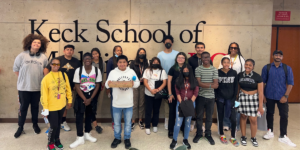
Saumya Joshi in front of the Hoover Dam. PHOTO/SAUMYA JOSHI.
Growing up in Lucknow, India, Saumya Joshi revered the Hoover Dam. After watching an episode of the docuseries “Megastructures,” she was left in awe of its formidable design and the enormous effort and resources that went into building such an important structure.
“The Hoover Dam has one of the largest reservoirs in the U.S.,” Joshi said. “They were able to create something in the 1930s that is still among the largest in the country. For the first time, ideas from smaller projects were adapted at a massive scale. Cities like Los Angeles initially thrived because of that water.”
Joshi, a graduating master’s student in the USC Viterbi School of Engineering, does not come from a family of engineers. For a while, she imagined she’d be a doctor, until she realized that working in medicine required a certain comfort level with blood. But after learning about the possibilities of construction engineering and falling in love with structures from the Hoover Dam to small, beautiful homes around Lucknow—where she says architects and builders really let their imaginations go wild—she knew she’d be better suited among buildings.
Joshi combined her admiration of massive structures with a fearlessness to explore construction engineering in new arenas. “My parents inculcated that feeling that I needed to be independent since childhood,” she said. “Even though they were fearful, they pushed me to try different experiences.”
From Lucknow, Joshi went to Mumbai, where she worked for a ready mix concrete company for two years. Despite being in a male dominated industry, she said her mentor, a male supervisor, was encouraging. “I was never asked if I was able to do something,” she said. Her abilities were assumed—and encouraged.
Once Joshi arrived in Los Angeles, joining her husband, a structural engineer who studied at Stanford University, she fell in love with the city. Downtown, she said, was especially inspiring, with its large buildings looming over the 110 freeway. “I like to watch the buildings at night. It’s my favorite part about L.A.”
It was also the construction industry that surrounds Los Angeles that sold the love story.
“All the major construction companies are here, so I knew I would get good opportunities,” she said. Still, she worried that it would take months to find an internship. But she found one with DPR Construction during her first semester in the Sonny Astani Department of Civil and Environmental Engineering. “I was literally jumping up and down outside the library,” she said.
For Joshi, the love of construction is pure and simple. “It’s just the sheer magnanimity of it,” she said. “One day the drawings are on paper, and then a year later, or a couple of years later there’s something so massive and so beautiful that thousands worked on.”
Engineering in the Modern World
Joshi said that her time at USC helped expose her to changes in the industry that might be forthcoming—changes that make her both excited and nervous.
“I couldn’t imagine how AI would be used in construction at first,” she said, “I used to associate technology only with Silicon Valley, but after coming to USC, I saw how it affects us every day and in our industry.”
Joshi cites uses like building information modeling to anticipate future problems, or helmets that can take pictures as you walk through a site—which then would correlate to a project schedule and report—as tools she’d be excited to use.
Joshi’s sister is 14 years her junior and Joshi hopes she can enjoy the same privilege of choice. “I hope that she can follow her passion like I did,” she said. “There was a time when my words didn’t have weight in others’ opinions, because I’m a woman in this field. They assumed I didn’t know what I was doing, and I’d switch out after a while. But I was lucky enough to have mentors that provided me with opportunities as a colleague—not as a woman or a man.”
Joshi knows this is easier said than done. She cites her family’s support as a huge reason for her success, but acknowledges that many parents are skeptical about sending their daughters into fields like construction engineering, because they are concerned about how their daughters will be perceived and treated.
Of course, there are also stereotypes. “Parents want their daughters to go into fields that don’t require much movement,” she said. “I want to change that opinion. This field is equally as good for women as it is for men.”
More than that, Joshi said, she’s always up for a good challenge. “A little challenge is important in life. A little tension about anything you do makes you more attentive toward your work,” she said. “If anyone tries to tear me down along the way, I know I can use that challenge to become better.”
Published on May 12th, 2021
Last updated on September 27th, 2021













